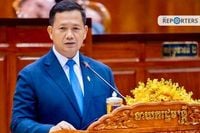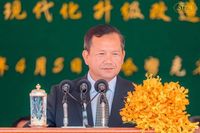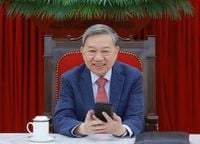On April 4, 2025, Cambodian Prime Minister Hun Manet made headlines by reaching out to former US President Donald Trump regarding trade relations between the two nations. In a letter posted on social media, Hun Manet expressed Cambodia's willingness to negotiate the import tariff rates on its goods, which are set to face a steep increase due to Trump's recent announcement.
The letter addressed Trump's declaration made on April 2, 2025, which stated that a hefty 49% tariff would be imposed on Cambodian goods starting April 9, 2025. In response, Hun Manet urged Trump to reconsider this decision, proposing a dialogue to address the tariffs and seeking an extension on the implementation of the new rates.
"To demonstrate goodwill and in the spirit of enhancing bilateral trade relations, Cambodia is committed to reducing import duties on 19 items from a maximum of 35% to just 5% immediately," Hun Manet stated in his letter. This gesture is aimed at fostering a more favorable trading environment and reinforcing the economic ties between the two nations.
According to the Khmer Times, Hun Manet's communication reflects Cambodia's intent to engage constructively with the US, emphasizing the importance of maintaining a beneficial trade relationship. The Prime Minister has tasked his Minister of Commerce to coordinate with US trade representatives to facilitate these negotiations.
Hun Manet's letter is not just a plea for reconsideration; it is a strategic move aimed at mitigating the economic impact that a 49% tariff could have on Cambodia's exports. The Prime Minister's commitment to lowering tariffs is a clear signal of Cambodia's desire to maintain and enhance its trade relations with the United States, which is crucial for the country's economic stability and growth.
Meanwhile, on the same day, Vietnam's General Secretary To Lam engaged in a phone conversation with President Trump, discussing the strengthening of US-Vietnam relations. This conversation included discussions about trade, with Vietnam expressing its readiness to reduce import duties on US goods to 0% in an effort to promote a more balanced trade relationship.
During the call, which included participation from Prime Minister Pham Minh Chinh and other officials, To Lam emphasized the mutual benefits of cooperation between Vietnam and the US. He proposed that Vietnam would like to import more American products while also encouraging US companies to invest in Vietnam.
Vietnam's commitment to reducing tariffs is indicative of its broader strategy to enhance its economic ties with the US, especially in light of the recent announcements regarding tariffs on Cambodian goods. The dialogue between Vietnam and the US highlights the competitive dynamics at play in Southeast Asia, where both Cambodia and Vietnam are vying for favorable trade conditions with the US.
Trump's administration has previously emphasized the importance of fair trade practices, and both Cambodia and Vietnam are keen to align their trade policies with these expectations. The willingness of both countries to negotiate tariff reductions reflects their understanding of the critical role that trade plays in their economic futures.
As Cambodia and Vietnam navigate their respective trade negotiations with the US, observers are keen to see how these discussions will unfold and what impact they will have on the regional economic landscape. The stakes are high, as both nations seek to secure advantageous terms that will benefit their economies and populations.
In conclusion, the letters and conversations that took place on April 4, 2025, signify crucial steps in the evolving trade relationships between Cambodia, Vietnam, and the United States. Both Hun Manet and To Lam are advocating for more favorable trade conditions, which could reshape the economic ties that bind these nations to the US. As negotiations continue, the outcomes will likely have significant implications for trade dynamics in the region.



